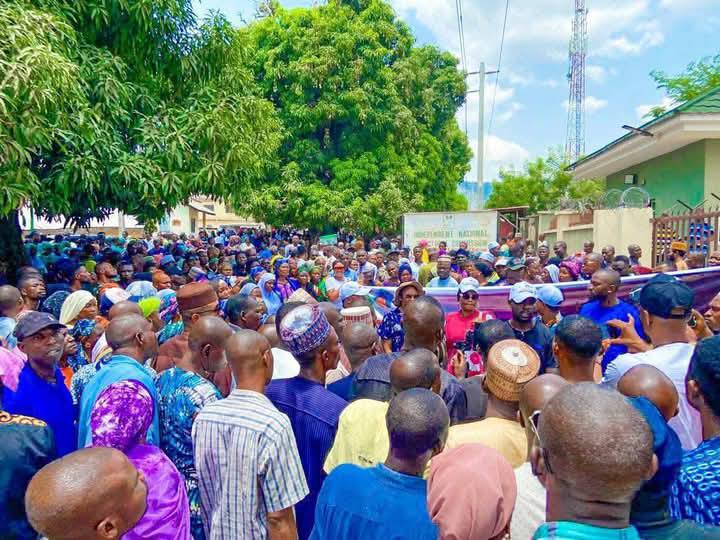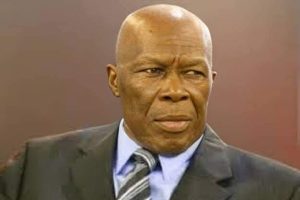BREAKING: Massive Protest Erupts as Kogi Central Women Lead #NatashaMustGo Campaign, Storm INEC Headquarters in Lokoja
In a dramatic turn of events, members of the Kogi Central constituency have taken a bold step toward recalling their senator, Natasha Akpoti-Uduaghan, from the National Assembly. A formal petition was submitted to the Independent National Electoral Commission (INEC) on March 24, calling for the commencement of the recall process due to alleged dissatisfaction with the senator’s performance. This marks a significant chapter in the political landscape of Kogi Central and could set the stage for an intense legal and political battle.
Senator Natasha Akpoti-Uduaghan, who has represented the Kogi Central district in the Nigerian Senate, now faces the prospect of being recalled by her constituents. This unprecedented move follows a series of controversial events that have contributed to a growing sense of disillusionment among her supporters and constituents. As part of the Nigerian electoral framework, a recall process requires substantial backing from voters within a constituency. According to the country’s laws, at least 50% of the registered voters must sign a petition for a recall to proceed.
In this case, a significant number of constituents — over 250,000 out of the 488,000 registered voters in Kogi Central — have reportedly signed the petition, meeting the threshold for initiating the process. The petition is a formal request for the Independent National Electoral Commission (INEC) to trigger the recall process, which will include a verification process and a referendum.
On Monday, March 24, Charity Omole, a spokesperson for the petitioning constituents, addressed the press, emphasizing the need for a representative in the Senate. She voiced the frustration of the people of Kogi Central, who believe they can no longer afford to have a senator who does not adequately represent their interests. Omole insisted that the decision to file the petition was a collective one, driven by the constituents themselves.
“We have come to recall her so that we can have a representative in the Senate. We are here to tell INEC to please follow the constitutional process for a recall so that a recall process can begin,” Omole stated. She further elaborated on the gravity of the situation, asserting that Kogi Central could not be left without a voice in the Senate at this critical time.
Omole was adamant that the petition was not orchestrated by external forces. There had been rumors circulating that the recall effort might be politically motivated or backed by powerful figures seeking to replace Akpoti-Uduaghan with a more favorable candidate. Omole, however, dismissed these speculations, clarifying that the initiative had originated purely from the people of Kogi Central. She made it clear that no one was financially backing their efforts, stating, “We are the ones that voted her and we don’t want her anymore because we cannot afford not to have a representative. Nobody is bankrolling us. Nobody is having any personal issue with her. It is just what it is. The game is the game.”
The petition underscores the frustration felt by the people who feel neglected by their elected representative. While Akpoti-Uduaghan had campaigned on promises of better representation and reform, her actions and decisions in office have apparently led to a perception of failure in fulfilling those commitments.
The call for recall comes on the heels of significant controversy surrounding Akpoti-Uduaghan’s conduct in the Senate. On March 6, the senator was suspended from the Senate for “gross misconduct.” This suspension followed an incident during a Senate session when Akpoti-Uduaghan was involved in a heated altercation with Senate President Godswill Akpabio over a seating arrangement. The clash quickly escalated, garnering significant media attention and public scrutiny.
The suspension was especially contentious because it occurred shortly after Akpoti-Uduaghan made serious allegations of sexual harassment against Senate President Akpabio. Her accusations against the powerful figure were widely discussed in the media, further adding to the tension between her and other lawmakers. While some viewed her claims as part of a wider conversation about sexual harassment in Nigerian politics, others saw the timing and manner of her accusations as a reflection of the senator’s deteriorating relationship with her colleagues.
These incidents have clearly contributed to a growing sense of disillusionment within Akpoti-Uduaghan’s constituency. While she had gained prominence for her vocal advocacy on issues such as women’s rights, development in Kogi Central, and anti-corruption efforts, her time in office has been marked by controversy, clashes with fellow lawmakers, and dissatisfaction from her constituents.
In accordance with Nigerian electoral law, the process of recalling a senator requires several steps. After the petition is submitted to INEC, the commission is responsible for reviewing the petition and ensuring that it meets the necessary legal requirements. If the petition is validated, INEC will proceed to the verification stage, where it will check the authenticity of the signatures and ensure that the necessary quorum is met.
Once the verification is completed, and if the petition meets all legal requirements, the process will move to the next stage — a referendum. At this stage, voters in Kogi Central will be asked to vote on whether or not they want Akpoti-Uduaghan to remain in office. If more than 50% of the voters in the constituency vote in favor of the recall, the senator will be removed from office and a by-election will be held to elect her successor.
INEC has a maximum of 90 days from the date the petition is submitted to complete the entire recall process. This timeline is critical, as it sets a clear deadline for both the commission and the petitioners.
The situation in Kogi Central is one that is being watched closely by political analysts and observers throughout Nigeria. The state of Kogi has long been a hotbed of political rivalries, with several figures vying for influence at both the state and national levels. The recall petition against Akpoti-Uduaghan highlights the dynamic and often unpredictable nature of Nigerian politics, where political fortunes can change quickly based on both local and national issues.
It is important to note that while Akpoti-Uduaghan’s constituents are seeking her recall, there are still supporters within the constituency who believe in her abilities and leadership. They argue that she has been a vocal advocate for the people of Kogi Central and has fought for issues that matter to her constituents. These supporters may seek to rally against the recall petition and mobilize voters to block the process in the event that a referendum is held.
The political landscape in Kogi Central is thus poised for an intense and highly charged contest. If the recall process moves forward, it could lead to a fierce battle between those who want to see Akpoti-Uduaghan removed from office and those who believe she still has much to offer her constituents.
For now, the fate of Natasha Akpoti-Uduaghan hangs in the balance as the INEC review process begins. The senator, who had previously made a name for herself as a passionate advocate for the rights of women and marginalized groups, will now have to confront her critics and seek to repair the damaged relationships with her constituents. The recall process, which was initiated by those who feel she has failed to deliver on her promises, will serve as a crucial test of her political viability.
Whether or not the recall process succeeds will depend largely on the outcome of the referendum and the political dynamics within Kogi Central. Akpoti-Uduaghan has not publicly commented on the recall petition, but her political future is now uncertain. Her next steps will likely include reaching out to her supporters and attempting to rebuild the trust and goodwill of her constituents.
In conclusion, the petition for the recall of Senator Natasha Akpoti-Uduaghan is a significant development in Nigerian politics. It underscores the importance of accountability and representation in the country’s democracy. The outcome of this process will be closely monitored, and it could have far-reaching implications for both Kogi Central and Nigerian politics at large. As the petition is reviewed and the legal process unfolds, all eyes will be on INEC and the people of Kogi Central to determine whether their senator will remain in office or be replaced by a new representative.





